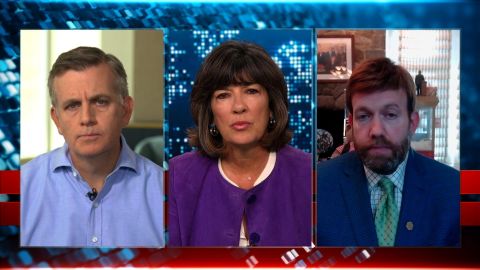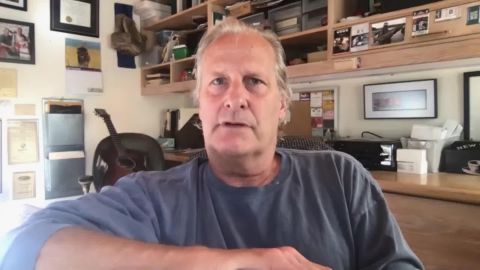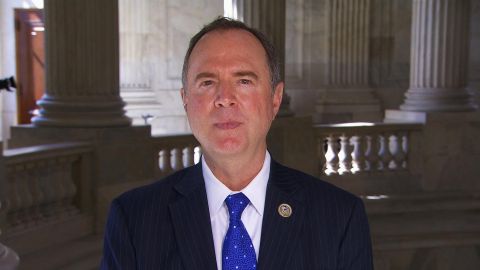Read Transcript EXPAND
CHRISTIANE AMANPOUR: And now the former FBI Director James Comey is also testifying before the Senate Judiciary Committee today over the FBI’s 2016 Russia investigation. It is the latest twist for Comey, whose fractious relationships with both Hillary Clinton and Donald Trump have transformed both his life and his career. Now a new miniseries ripped from the pages of Comey’s own memoir is dramatizing the story. It is called “The Comey Rule.” And the Emmy Award-winning actor Jeff Daniels plays who? Comey. Here he is talking to our Hari Sreenivasan about it.
(BEGIN VIDEOTAPE)
HARI SREENIVASAN: Christiane, thanks. Jeff Daniels, thanks for joining us. So, “The Comey Rule” just rolled out on Showtime. And for those who didn’t watch it, the first episode is really about everything that led up to the 2016 election, and then James Comey’s involvement, and then the second episode was what happened after. I want to ask. I mean, you have played so many different types of characters. What drew you to play James Comey?
JEFF DANIELS, ACTOR: Well, as an actor, I didn’t know how to do him. And that’s — there’s a risk of failure in that. I have been doing that a lot since “Newsroom” and everything after that. There was always — it wasn’t an easy, oh, yes, I know how to do that. And Comey was the same thing. Just as a dramatic character, he’s a — he’s complicated. And so — and the story is complicated. So, just from the initial, do you want to do it, there’s a risk of failure. And that’s kind of brought the challenge of acting back to me over the last 10 years. And so that was the main reason I jumped in.
SREENIVASAN: I want to show a clip for some of our viewers. It’s sort of the infamous dinner, the loyalty dinner.
(BEGIN VIDEO CLIP)
DANIELS: It’s true. Mr. President, you can fire the FBI director at any time for any reason or for no reason at all. But I want to stay, because I love the bureau and I love my job and I believe I’m doing it well.
BRENDAN GLEESON, ACTOR: One thing I never had to think about the Trump Organization, because I did so much myself — people think we were so big, but the truth is, I did everything. And I have to rely on people. I have all these idiot advisers around who think they got me elected. You know who I actually listen to? TV people, because they have got to get ratings every day. A White House adviser can guess wrong, still keep his job, not the TV guys. A lot of smart people in that business.
DANIELS: Well, you can rely on me, sir, to tell you…
GLEESON: I need loyalty.
(END VIDEO CLIP)
SREENIVASAN: When you’re watching that, as somebody who is not privy to what happened in that conversation, someone who didn’t read James Comey’s book, you’re thinking to yourself, this is a moment where he is realizing, in a way, that his whole philosophy of life has totally been challenged by the person sitting across the table from him.
DANIELS: Yes, who happens to be the most important person in the country, as president. That scene is a great example of, on one side of the table, you have got honesty and decency and respect for the rule of law, of telling the truth at all costs, and, on the other side of the table, you have the opposite of that. And I think a lot of what’s going on with the country now, that that’s part of the polarization that we’re seeing. It was a reminder to me and maybe to people who see it of what honesty and decency and respect for the rule of law looks like and sounds like, and I think “The Comey Rule” is a great example of putting that on display and reminding us what we have lost and what we could lose forever.
SREENIVASAN: And during that taping, turns out the real Jim Comey was watching. What was that like?
DANIELS: That was the day Jim came to the set. And, fortunately, I had been shooting for two months. So, I had him and was told I had him. So I was OK. And I have a job to do. We have got to get through that eight-page loyalty dinner scene, which is tough. And Brendan Gleeson came in, no rehearsal, no running lines. Roll camera, go. They did a couple of takes on the wide shot. And then Billy Ray, the director, writer, said, got somebody I want you to meet, which I knew he was coming. I just didn’t know he was there then. And he — Jim walks around the corner. And you hope he likes it, because it’s not like we’re going to reshoot two months. But it’s — you hope that it’s authentic. You hope that he recognizes himself.
SREENIVASAN: And what did he say?
(CROSSTALK)
DANIELS: Yes, because of — well, he said — he said: “You ruined my day. You brought back all the emotions. You brought back all the awkwardness, the I don’t know what to say to that, the trying to keep up with Trump’s subject switching and spinning and this and that.” And he said, “You brought it all back.” And it made him a little nauseous, which usually is not the kind of thing you say to an actor after a performance. But, for me, it was a great compliment.
SREENIVASAN: What kind of research do you do? I mean, if that’s — if you have been shooting for two months, how did you get him? How did you get him down?
DANIELS: I didn’t meet with him beforehand. I offered to near the end of the run of “To Kill a Mockingbird” on Broadway. I couldn’t leave. And so, if you’re in New York, stop up. And he had no plans to come up and didn’t, which I was fine with. I didn’t want to impose myself on someone who’s been vilified and then go down and watch him eat dinner. I had enough. For any character, I had enough. I had the book. I had the audiobook where Jim read it. You have YouTube. He’s everywhere. So, I had plenty going in. I learned soon on that one of the things I said in October 2016, when the case was reopened, I said, what is he thinking? And the film shows what he was thinking. And so that became how you approach it. You don’t put a lot of, let me try to pretend I’m Jim Comey, because you’re not going to believe that. You already know it’s me, Jeff, the actor, and you’re not — it’s going to read false, either consciously or subconsciously. So I didn’t do much of anything. But I thought what he thought. And so thinking like Jim Comey, feeling what Jim Comey felt, and then sitting on honesty, decency and respect for things like the rule of law that are bigger than he was, that became the approach.
SREENIVASAN: What’s also interesting about this is that Gleeson’s performance of — on Trump isn’t really kind of a parody or a mocking one. It’s not Alec Baldwin. When you watched it, when you were obviously in the scenes with him, how did you — how do you think about that?
DANIELS: Comey said something about being with Trump when you’re alone in a room with him three feet away at a loyalty dinner, for instance. You see something that you don’t see on television, and that’s a private menace. And I think Brendan found that. I think he found the darkness. I think he found the — whatever it was Brendan found. I didn’t talk to him. But there was something that pulled you in, which is part of film acting. You want, again, to pull the audience in. And I think Brendan did a brilliant job of suggesting Trump with the voice, with the hair, but not in a caricature kind of way, enough that — again, that it’s like you recognize Trump, but you know it’s not Trump. And then you’re leaning in, and then the actor that Brendan Gleeson is pulls you in the rest of the way to what he wants you to feel and see. That’s what I was watching. I was watching a brilliant actor use the tools to reach an audience in a way that was going to surprise them. And it surprised me that day in a great way.
SREENIVASAN: There’s another clip, which is the decision process before deciding three days before the election to make a statement that there are new e-mails.
(BEGIN VIDEO CLIP)
DANIELS: We don’t announce, and three days before the election, word leaks, the FBI has reopened the investigation on Hillary Clinton, not told anyone about it, where does that put the credibility of this institution? Another scenario, Hillary’s just been elected. Republican-controlled House is drafting bills of impeachment before she’s even sworn in. Now imagine we find something incriminating. We present those findings to House Judiciary. They ask us when we first found these e-mails, and will be obliged to say that we learned of them a month before the election. And the world will conclude that we actively concealed this from the American public in order to tip the election. Where does that leave the credibility of this institution?
UNIDENTIFIED ACTRESS: Any letter that you put out at this juncture is going to be interpreted by the public to mean that we found new evidence of wrongdoing?
DANIELS: If I don’t inform Congress on this, I should be fired, run out of town.
UNIDENTIFIED ACTRESS: But, boss, what if our doing this results in the election of Donald Trump as president?
(END VIDEO CLIP)
SREENIVASAN: You know, by that time in the episodes, the audience gets also a sense of arrogance with Jim, that he alone is the finger in the dike, he’s the person holding, in a way, democracy together, and not his bosses. He doesn’t trust them. I mean, there’s a level of mistrust that he has, and that he is the last barrier here, where, technically, there are systems, but he doesn’t have faith in those systems.
DANIELS: He doesn’t — he didn’t have faith in the people that were in the positions to execute those systems the way they were meant to be executed. And I think, three or four years later, we’re seeing an even more grossly attack on those — Department of Justice, things like that. He did have a sense of, I know what’s right. He was guided by the rule of law and what he believed was right. And you could shake him from that if you made a convincing argument. And they didn’t. He felt that the people around him, above him who could have made the statement, like in the July — were compromised — not comp — were tainted because of having met with the Clintons on the tarmac, and that Sally Yates had worked for — worked under Loretta Lynch. And these are all — he could have done it differently. But that’s what he did. And he did it because he believed that it was at least the most uncompromised, untainted version, apolitical version of — that he could present. And, as somebody says in the movie, Jim believes being right will save him. And it didn’t know.
SREENIVASAN: There are a couple of scenes, where I don’t want to use this diminutive way, but there’s almost this Pollyannish faith in institutions. I think Sally Yates’ character says something about, look at these buildings on 1600 Pennsylvania — or look at these buildings on Pennsylvania Avenue. They have been here for so long. They’re going to be here. Now, in 2020, as a citizen, when you look at that, does that seem like an antiquated idea? I mean, because we also — in our conversation, you are talking about what’s on the ballot right now is the virtues. But we have had an attack from within institutions in such a novel way, that the country seems to be in a different place just in a matter of four years.
DANIELS: The country is broken. And I’m — it’s my feeling that Trump and what is now the Republican Party have broken it. We have to have our institutions and rule of law and respect for those things as things that are bigger than us, sacred. They have been here for 240-plus years. And it’s not our — we haven’t earned the right to destroy them. I don’t think it’s Pollyanna. I think it’s the thing that separates us from another one-party rule, authoritarian country, institutions like that, and respect for them. We have lost so much in the last four years, decency, honesty, respect, compassion, respect for the rule of law. I mean, it’s all there. But with that comes a resistance and an outrage. And you’re seeing it after George Floyd. You’re seeing it in the Women’s March on the day after his inauguration. And you’re seeing it in countless other ways. That outrage is real. And I think November 3 is an opportunity to — for a new America. It really is. It could be the first chapter of a new America. And — but you have to — you have to end what’s going on now. And if the people show up, I have great hope that those institutions and the sacredness of those institutions and what makes America what it is, that generous, compassionate, great country that it claims to be, I think that could happen on November 3, and certainly in January. But it’s — obviously, there are people who don’t want that. And we will see. We will see how it ends up. I have hope.
SREENIVASAN: What you’re saying now echoes that first speech that you had as Will McAvoy in the “Newsroom,” at least the second part of the speech, where you’re a bit melancholy, and you’re kind of longing nostalgically for a day when America was great and can be again. When you mention Republicans, I remember reading that I think, I don’t know, your dad was a mayor of the town that you lived in a long time ago. And that’s a different party than when he was around.
DANIELS: Yes. I mean, Stuart Stevens in his book “It’s All a Lie” will tell you it’s always kind of been there, that white supremacy and dominant caste and all that. Isabel Wilkerson’s book “Caste” just spells it out beautifully. It should be required reading for every white American. But my dad believed in all those things, family values and church and respect for others and compassion and all of that. There was — to completely blast the Republican Party as a bunch of unfeeling whatevers, I have countless stories of my dad teaching me things that no one in this Republican Party would do today. And I feel badly for those Republicans. I have friends of mine who are just — they’re lost. And I think it’s an opportunity for them. Reince Priebus said, after Romney lost, we have to open our tent. And I think a large white hand just slapped him upside the head. And there you go. And, suddenly — and then Boehner is sitting in the Rose Garden with Obama talking about a grand bargain, and they jerked his leash so hard, he retired. My dad would be spitting, he’d be so mad.
SREENIVASAN: At the end of “The Comey Rule” is one of possibly the saddest parts, which is when you start realizing and you see on the credits all these different characters that were involved in this either have resigned or been fired or left to a different agency. People around the president are gone. But then you also say, well, there’s good people that are in government that are also homeless now, that are also leaving.
DANIELS: Career civil servants who just decided that they could no longer check their integrity at the door. Sally Yates was hauled before Congress first. She was fired, and then she was hauled before. And she stood up. She stood up to those people. And she was, I think, the first example in this mess of an apolitical public servant in the struggle that she had and others had to simply do their jobs without being politically influenced when making decisions. Jim was next, followed by Fiona Hill, William Taylor, Colonel Vindman, Marie Yovanovitch, others. These are not bad people. These are good, honest, decent people with integrity who are trying to serve something bigger than themselves, which is this country that you happen to live in. And they are being disrespected and tossed to the side, so someone can be reelected and stay out of jail.
SREENIVASAN: Jeff Daniels, thanks so much.
DANIELS: You’re welcome. Thank you, Hari.
About This Episode EXPAND
Pollster Frank Luntz and former Bloomberg campaign manager Kevin Sheekey react to last night’s presidential debate. Rep. Adam Schiff discusses a new report from the House Intelligence Committee on U.S.-China relations. Actor Jeff Daniels explains what it was like to play former FBI Director James Comey on screen.
LEARN MORE


